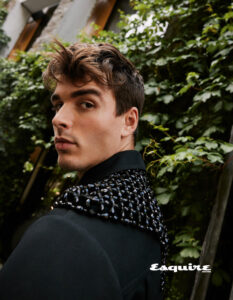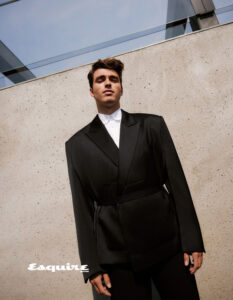
Despite few appearances in short films and open-air theatre productions, and a very brief stint on The Sandman, Corey Mylchreest delivered surprising presence as King George III on Queen Charlotte. In our audience with the king, we dive into the Mylchreest headspace, traversing the acting world and where he’s heading next
In the acting world, Corey Mylchreest is considered to be in the throes of infancy. He is a relative unknown as far as actors go, but his portrayal as King George III on Queen Charlotte has got him newfound fans and acclaim.
The spin-off from Bridgerton, Queen Charlotte follows the titular queen in two phases of her life. The elder Queen Charlotte is still played by Golda Rosheuvel from the original series, with the younger queen portrayed by India Amarteifio. Cast opposite her is Mylchreest, as the young King George III. The series focuses on their marriage and the effects of King George III’s ailment.
Still reeling off from junkets and interviews, Mylchreest has to contend with one more: ours. Thus, a day before his photo shoot with Esquire Singapore, we meet over a Zoom video call for his turn on the hot seat. Mylchreest’s hair has grown out, which softens the angles of his mien. He’s relaxed, his posture slants, favouring his right, as he sits in what appears to be the nondescript room beneath the attic.
I congratulate Mylchreest on the success of Queen Charlotte and his performance in it and ask, not certain if the question puts him in a spot, because Queen Charlotte is a Bridgerton spin-off, how he feels about the hype around the sex in the series overshadowing the drama, the complex human nature and acting?
“In the eyes of the beholder, that’s where the story lies,” Mylchreest says. “But that is the point of all storytelling—it is for the audience, not for us. It doesn’t really matter what I think; whatever the audience chose to focus on, that is success for the show.”

While there were challenges in filming Queen Charlotte’s intimate scenes, Mylchreest sees more difficulty in accurately portraying George’s mental affliction without bordering on caricature.
“That was something that I was really worried about. We wouldn’t be diagnosing King George and that brought a heightened importance to what I think is the antidote to caricature: specificity and detail.”
For his role, Mylchreest dives deep into the sea of research. He spoke to a specialist about the script; on whether he was going in the right direction to highlight the moments where George transitioned from confusion to lucidity.
“There was a doctor’s report,” Mylchreest adds. “A sort of daily report that was sent to Charlotte. They were delivered later in his life but it was still useful to read. It was so factual, so black-and-white. It’d describe the days when George would talk non-stop for 12 hours and would start to foam at the mouth because he has been speaking for so long. Then, there was an entry that said, though his mind was still ravaged, George seemed physically at peace.
“It’s very clinical, without emotions, these documents, but the pain of that moment seemed to scream out. By then I’d done a lot of research and it was then that my empathy peaked. I just wanted to hug him. He didn’t have an easy life by any means.”

Like Mylcreest’s research into KingGeorge III, I’ve embarked on my own into Corey Mylcreest.
Search results on him reveal myriad interviews of him doing press for Queen Charlotte. There is only one social media platform that he’s on—Instagram—and on his feed, his first post is dated 7 April 2022. The casting of Queen Charlotte was announced the day before, 6 April 2022. For a Gen Z, you’d think that he would be more active on social media.
“I have a private account,” Mylchreest says, “but the last time I was on it was maybe four months ago, and before that, I wasn’t on it for about three or four years. I think I jumped off it in 2019 because I find Instagram, or social media in general, a hotbed for procrastination. I don’t think it’s necessarily the healthiest place for people’s mental health.”
But Mylchreest sees benefits in getting on social media. It’s a fantastic vehicle for getting the word of Queen Charlotte and any other projects he’s part of out there. “If I was going to be on it, I’d want to make it limited in some way. Not only to protect my own privacy and the people around me that I love, but also to protect my own work ethic.”
Is that part of the reason for privacy? That if the public were to know more about your personal life it would affect how you’d portray other lives on screen.
“That’s a really good question,” Mylchreest says. He thinks about this for a while. “I think that there’s an inherent usefulness in the mystery of someone. Especially when you use your appearance like an instrument. Sometimes the less someone knows of you, the more powerful your character portrayal can be.”
